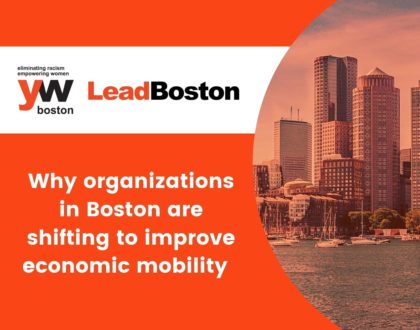Why organizations in Boston are shifting to improve economic mobility

With YW Boston’s LeadBoston Class of 2022 cohort having recently begun the program year, 43 mid-to senior-level professionals are well underway in gaining the tools to address diversity, equity, and inclusion (DEI) challenges not only at their own organizations but throughout the City of Boston. To achieve this, our hands-on developmental program offers opportunities for leaders to learn about systemic issues affecting Boston and participate in facilitated discussions with local experts on various topics.
On January 19th, our LeadBoston Class of 2022 participated in their first program day with the topic of Class and Poverty in order to understand the entrenched nature of poverty in Boston, identify which populations are most impacted by poverty, and explore the impact of race, gender, and class on economic opportunity.
To help understand this systemic issue, LeadBoston participants received a curated list of resources and were able to discuss poverty and economic inequities in Boston with two experts in this field.
One of the speakers was Kamaria Moore-Hollis, Economic Mobility Manager at the Department of Transitional Assistance (DTA), which “assists and empowers low-income individuals and families to meet their basic needs, improve their quality of life, and achieve long term economic self-sufficiency.” The DTA provides “direct economic assistance (cash benefits) and food assistance (SNAP benefits), as well as workforce training opportunities.” The second guest speaker was Madeligne Tena who is a Financial Coaching Manager at Compass Working Capital (“Compass”), which “provides savings and financial coaching programs that support families with low incomes to build assets, achieve their financial goals, and become financially secure.” Helping facilitate this discussion between the speakers and LeadBoston participants was Jeff Rodgers, who is a LeadBoston Moderator.
LeadBoston participants explore common financial barriers
A foundational starting point to understanding economic inequities is examining some of the common financial barriers that people face. Madeligne touched upon some of the barriers she frequently observes when first meeting someone as a coach at Compass. These included limited income, partaking in risky financial practices such as payday loans, going to pawn shops and/or “Buy Here Pay Here” dealerships or taking out loans for cars. Other common challenges include experiencing a lack of savings of any kind, including emergency savings, lack of credit history, or some type of debt level.
Financial cliff effects are another significant barrier, which describes the idea that as one’s income goes up, the amount of support one can receive goes down. Jeff gave the hypothetical example of a mother making $29,999.99 dollars a year and being able to receive childcare support from government programs but if they were to earn $30,000 that support could then be removed. Due to this, a mother might decline a promotion or raise because as soon as they hit the $30,000 threshold, they’d have to pay for childcare which in the end could cause them to have a decreased annual income. “If you think about it, it’s a disincentive to climbing and succeeding and moving forward,” Jeff said.
Kamaria discussed some of the cliff effects she observed while working at the Department of Transitional Assistance. One of these included the fear of losing health insurance as one’s income goes up. Kamaria mentioned that this perception reflects an opportunity for the DTA to improve communication about what really transpires. Few people are taking advantage of an earned income disregard they instituted a few years ago. Here, when a person gets a job, they’re able to keep that income and their Transitional Aid to Families with Dependent Children (TAFDC) benefits up to 200% of the poverty level.
The program day deepened the leaders understanding of equity
The LeadBoston 2022 Class & Poverty program day speakers emphasized that participants should put themselves in places where they can challenge their existing perceptions and bias. As well as take agency in their power and privilege to recognize that everyone has power in some shape or form. “You will give that person back dignity and respect when you also realize their power. When you see their power as well,” Madeligne said. “Continue to do things like being part of LeadBoston. Collaborate with others – it only takes one person, right? So be the founder or be the person that gets a movement going and see where you can make an impact.”
Coming away from the Class and Poverty program day, the LeadBoston Class of 2022 took this advice to heart as 94% of participants reported that this program day challenged and deepened them understanding of equity issues in Boston. In reflection, one LeadBoston participant mentioned that one of the takeaways was, “That it actually takes more intention on my part to see inequity, and that I really need to get out of my bubble more often to see other people’s perspectives and lived experiences.”
___________
About LeadBoston
Become a part of YW Boston’s LeadBoston program and join a network of over 1,000 inclusive leaders in Boston. During this 11-month program, participants explore and learn how to address barriers to inclusion through facilitated dialogue, expert speakers, and peer learning. Through experiential activities, participants delve into the social, political, and socioeconomic realities of Boston and explore innovative solutions to inequity. Interested in learning more? Reach out to Rachael McCoy, Senior LeadBoston Manager, at rachael@ywboston.org with any questions about the program.
